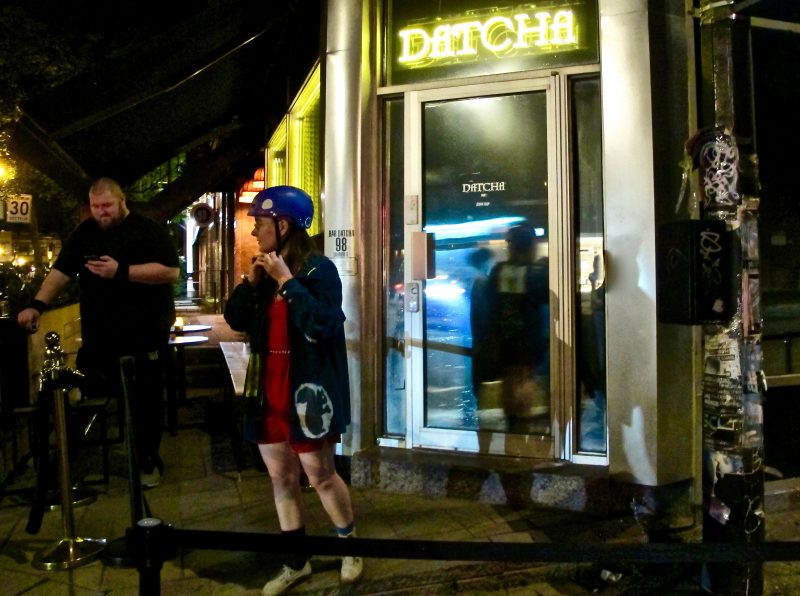Guardian angels hit Montreal’s clubs to tackle harassment
A women exits the Datcha nightclub in Montreal’s Mile-End neighborhood on June 28, 2019, where members of a group called PLURI are on the watch for abusive behavior
(Louis BAUDOIN)
Montreal (AFP) – On a Friday night, amid the flashing lights and heavy heat of Montreal’s Datcha night club, a drunken young man weaves his way through the crowd, grabbing women at the hips as he goes.
Calmly, 24-year-old Eliane Thivierge goes up to the party animal and explains to him that his behavior could make women uncomfortable.
“It’s okay to try to pick someone up, but you should know that there are acceptable ways of doing that, and unacceptable ways,” she says.
After a brief talk about consent, the man seems to have understood the problem, and the evening proceeds without further incident.
Thivierge, who recounted the story to AFP, is one of the co-founders of PLURI, a Montreal group formed two years ago with the goal of reshaping the culture of the city’s nightlife, where harassment of all kinds is rife.
Night clubs and rave organizers have turned to the group to tackle gropers, men rubbing themselves up against women on the dance floor, the use of date-rape drugs and other problems.
Similar schemes have emerged at the same time in other Canadian cities such as Vancouver and Toronto, as well as in Europe, including in Britain, France and Belgium.
The combination of night-time crowds, low lighting and alcohol can lead to undesirable behavior in environments that are not conducive to confrontation.
“In a party atmosphere, if someone fixes on you and is following you, it’s rare you’ll say anything to them,” Thivierge said.
– Stay with friends –
Caroline Moreau, an 18-year-old student taking a break in front of Datcha, says she gets harassed all the time.
“Every time I go out, there are guys who come up and grab my hips,” she said.
Even though that kind of intrusion bothers her, she considers herself lucky: she recently had to call an ambulance for a friend who had been slipped a drug by a man at a party.
Stories like that are common among the city’s party-goers and clubbers.
“In this environment, you have to stay with your friends and not go out on your own because something can always happen to you,” said Frederique Ledoux, another student.
For the members of PLURI trying to ward off these problems, there is no question of them playing the police officer.
“We don’t want to shame anybody — we want to have a conversation. We want there to be education happening,” said Sara Martin, who works at PLURI.
“At the same time, we’re trying to shift behavior so that people feel safe in this space.”
The basis of the group’s work is what they call “bystander intervention,” which means a third party getting involved when they witness harassment.
Sometimes it is enough for Martin to simply get some distance between the victim and the person who is putting them in an uncomfortable position, maybe by inviting them outside for a smoke or pretending to be an old friend.
Often, the people that the activists approach understand the problem and change their behavior.
“We almost end up giving lessons on how to pick someone up,” joked Thivierge. But it is mostly about explaining the concepts of consent and respect for other people’s personal space.
The task can be complicated when the person they are trying to reason with is very drunk, and some are quick to rebuff the activists’ approach — often spewing expletives.
“That’s a teaching experience I don’t want to take on,” said Thivierge.
– Changing awareness –
If talking does not work and “someone gets agitated, we have traditional bouncers for that,” said Adam Wilcox, a longtime DJ and co-owner of Datcha who has frequently witnessed “sexual harassment, physical intimidation and violence.”
“These are just things that people expect somewhat from nightlife culture and it’s what gives it a bad name,” he added.
By paying for PLURI’s services, he hopes to change that dynamic.
More and more people are turning to PLURI, whether for their members to attend events or for training, said Thivierge, who has noted a change in attitude in recent years.
“Socially, with MeToo among others, it is a conversation that is being held more and more, and people are looking for a resource that is focused on the party environment,” said Thivierge.
While it is difficult to quantify harassment levels in the city’s night life, a 2017 report by the Conseil des Montrealaises, a municipal organization focusing on the status of women, showed that more than half the people who responded to a questionnaire said they had experienced harassment or aggression while attending the numerous outdoor events hosted by the city.
To tackle the problem, the big festivals — the Osheaga, the Francofolies and the Jazz Festival — use the services of Les Hirondelles (The Swallows), a group whose services are similar to PLURI’s even if the context of daytime and public events is very different from the nightlife experience.
“We are simply trying to create spaces where people feel comfortable because their physical autonomy is respected. It’s very basic,” said Martin.
Disclaimer: Validity of the above story is for 7 Days from original date of publishing. Source: AFP.


